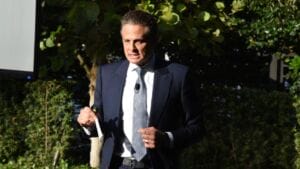Brad Preber, Managing Partner of Grant Thornton, discusses his first job selling seeds door-to-door, his mentors and what he learned along the way.
Brad Preber
Title: Managing Partner
Company: Grant Thornton
Describe your very first job.
When I was a teenager, I found an ad in the back of a magazine promoting the door-to-door sale of seeds. You earned points that you could convert into prizes or
cash. I used the money I earned selling seeds to my neighbors to buy a lawn mower that I then used to start lawn care business.
What did you learn from that first job?
I learned what it takes to sell and promote yourself. I experienced the courage it took to knock on someone’s door and the feeling of optimism that came when they actually did what I wanted them to do.
Describe your first job in your industry.
It was a summer job I took doing some bookkeeping for construction companies. I collected the transaction records, recorded them into the accounting books, and prepared financial statements.
What were your salaries in your first job and first industry job?
Selling the seeds was a point system and the points were converted into prizes or cash. I was paid $300 a month for doing bookkeeping for the construction company. I also had an opportunity to apply for scholarship money from the company. I was a broke college student so any extra money helped.
Who is your biggest mentor?
I don’t really have a single individual that I see as a mentor. Instead, I looked to teachers, coaches, and friends’ parents for guidance. I took small pieces of each of them into consideration for what I wanted to be when I grew up. They combined to become big portion of what I am today.
What lessons did you take from your high school coaches?
It’s very clear that the principle of the seven Ps — Proper Planning and Preparation Prevents Pretty Poor Performance — is as applicable to life as it is to football. Like football, it takes a team to be successful in business. You have to know your role, set goals for the team, and execute strategies to achieve them.
What advice would you give someone entering your industry today?
The good news is that there are still plenty of jobs to be had in accounting and finance. One thing most people don’t recognize is that there are rarely any home runs in this business. It’s a series of small steps and steady improvement over a long career that allows you to advance and move into ownership.
If you weren’t doing this, what would you be doing instead?
If I had the time and the capital to pull it off, I would have become an artist. If I didn’t have the capital to pull it off, I would have become a fly-fishing guide.



